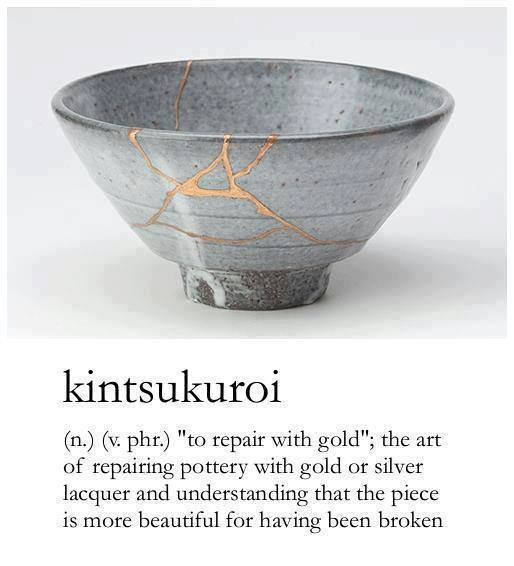This month, my rezooming friends, I have chosen to write a piece of a different color. Gold to be exact. I was skimming my Facebook page when I ran across this post by a friend. She is not an attorney, rezooming or otherwise, however her post hit me as the perfect topic for this month’s lesson on rezooming.

She posted the above picture.
It is an example of Kintsukuroi, the art of repairing with gold.
Japanese craftsmen developed this process as a more aesthetic means of repairing broken ceramic bowls. Collectors became so enamored with the new art form some accused Kintsukuroi artisans of deliberately smashing valuable pottery so they could repair it with the golden seams.
Kintsukuroi embraces an object’s flaws and imperfections. The Japanese value the marks of wear and tear on a beloved object. They indicate the loving use of a favorite bowl or cup. Kintsukuroi artisans use a gold/lacquer compound to fill the imperfections in a broken object. This highlights its cracks and repairs, embracing the events of its life, rather than allowing its service to end at the time of its damage or breakage. The object is made more beautiful by the use of kintsukuroi.
“Not only is there no attempt to hide the damage, but the repair is literally illuminated… a kind of physical expression of the spirit of Mushin. Mushin is often literally translated as “no mind,” but carries connotations of fully existing within the moment, of non-attachment, of equanimity amid changing conditions. …The vicissitudes of existence over time, to which all humans are susceptible, could not be clearer than in the breaks, the knocks, and the shattering to which ceramic ware too is subject. This poignancy or aesthetic of existence has been known in Japan as mono no aware, a compassionate sensitivity, or perhaps identification with, [things] outside oneself.”
I embraced the similarities between the rezooming of my legal career and repair by means of kintsukuroi. Experiences I have had while away from the law have been either the cracks, or the golden repairs. No matter which, they have enhanced my personal ability to understand and apply the law in a way someone who has always been inside the law cannot embrace. We all have unique cracks from the wear and tear of life. The cloak of law does not color our experiences rather your color comes from your own personal life experiences. As with the repairs made to a beloved teacup, your experiences create a unique and valuable piece made up of thoughts and imperfections to be saved, not tossed like some shattered shard of glass.
Take a moment and visualize your life as a beautiful vase repaired with many golden seals of kintsukuroi. The different path reflected in those repairs influences the way you practice law. Can you see the golden veins that come from the life you have lived? Embrace these golden marks as a time of growth away from the law. They bring freshness to your thought process.
As rezoomers, we tend to hide our golden cracks under a bushel basket, never letting them shine because we, ourselves, don’t see the value in the road we travelled. Take a minute and make the comparison between your non-law experience and the artistic work of the kintsukuroi artisans. Remember, “The vicissitudes of existence over time, to which all humans are susceptible, could not be clearer than in the breaks, the knocks, and the shattering to which ceramic ware too is subject.” As a rezooming attorney you must first see the beauty in the breaks, knocks and shattering of our life’s experiences before others see them as valuable.
Mend your own opinion of your time away from the law like a kintsukuroi artisan. Watch as the value of what you bring to the table shines like the glorious pottery valued for its imperfections. Visualize the years away from the law as your golden lacquer of unique experiences and let them shine. You will find that everyone will see them as beautiful imperfections if you embrace them as such first.
All opinions, advice, and experiences of guest bloggers/columnists are those of the author and do not necessarily reflect the opinions, practices or experiences of Solo Practice University®.





















Comments are closed automatically 60 days after the post is published.